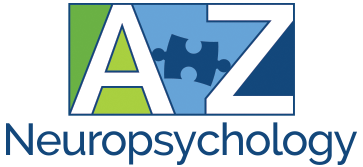Our Services
A-Z Neuropsychology provides psychological, neuropsychological, and psychoeducational assessment services for all ages, while maintaining a small therapy caseload. Services provided are listed below. Please call for more details at (520) 441-4006.
Evaluation to assess for developmental delays; evaluation includes an in-depth clinical interview with the parent(s) or guardian(s) of the child in question, direct observation and interaction with the child, administration of a developmental battery (Bayley-III) to assess cognitive, language, motor and social-emotional milestones, and solicitation of structured observer (e.g., parent/guardian, teacher, etc.) reports.
Evaluation also includes preparation of a detailed, written report. This report will be provided directly to the referral source and to the patient/parent/guardian following an in-person feedback session.
Evaluation to assess for autism spectrum disorder and related neurodevelopmental conditions; evaluation includes an in-depth clinical interview, ADOS-2 administration, formal assessment of intellectual and language functioning, and solicitation of structured observer (e.g., parent/guardian, teacher, etc.) reports; in high-functioning individuals, evaluation is best combined with a formal neuropsychological evaluation.
Evaluation also includes preparation of a detailed, written report. This report will be provided directly to the referral source and to the patient/parent/guardian following an in-person feedback session.
In-depth clinical interview to assess the nature and course of presenting complaints, as contextualized by the individual’s unique birth, developmental, medical, psychiatric, social, educational and occupational histories.
Evaluation also includes preparation of a detailed, written report. This report will be provided directly to the referral source and to the patient/parent/guardian following an in-person feedback session.
Evaluation to assess neurocognitive strengths and weaknesses in an individual with known or suspected medical risk factors and/or a history of brain trauma; evaluation includes an in-depth clinical interview alongside formal assessment of a variety of neurocognitive functions (e.g., general intellectual functioning, learning and memory, executive functioning, language functioning, visual spatial functioning, etc.) and a basic screening of psychiatric and adaptive functioning.
Evaluation also includes preparation of a detailed, written report. This report will be provided directly to the referral source and to the patient/parent/guardian following an in-person feedback session.
Evaluation to assess neurocognitive strengths and weaknesses in an individual with behavioral challenges and/or reduced functioning that would render traditional assessment procedures less informative; evaluation includes an in-depth clinical interview alongside formal assessment of a variety of neurocognitive functions (e.g., general intellectual functioning, learning and memory, executive functioning, language functioning, visual spatial functioning, etc.) and a basic screening of adaptive functioning.
Evaluation also includes preparation of a detailed, written report. This report will be provided directly to the referral source and to the patient/parent/guardian following an in-person feedback session.
Evaluation to assess for specific learning or intellectual disabilities; evaluation includes an in-depth clinical interview alongside formal assessment of general intellectual functioning, academic achievement, selective attention, and working memory, and may include personality screening and/or formal assessment of emotional functioning.
Evaluation also includes preparation of a detailed, written report. This report will be provided directly to the referral source and to the patient/parent/guardian following an in-person feedback session.
Evaluation to assess for attention-deficit/hyperactivity disorder; evaluation includes an in-depth clinical interview and administration of select psychological or neuropsychological assessment measures relevant to attentional functioning and impulsivity.
Evaluation also includes preparation of a detailed, written report. This report will be provided directly to the referral source and to the patient/parent/guardian following an in-person feedback session.
Psychological evaluation of candidates for surgery, including candidates for bariatric surgery, spinal cord stimulation, and transplant (donor/recipients); evaluation includes an in-depth clinical interview with assessment of factors relevant to treatment selection and recovery, alongside completion of procedure-dependent self-report mood screeners, structured inventories, and/or abbreviated neuropsychological assessment.
Provision of generally time-limited (e.g., 8-10 or 10-12 sessions) therapy, to address identified clinical targets and/or to provide formal education and support relating to known conditions of neurological compromise.
Click here to fill out our contact form and request information about our current groups and/or to find out how to be added to a waitlist for a group.
To schedule an evaluation, have your medical provider fax our office the following:
• A referral with relevant diagnosis codes (see our sample referral form for an example).
• The most recent clinical office notes, and any imaging (or other records) you'd like us to review.
• A demographics sheet that includes the contact and insurance information for the patient.
Let us help you find the missing piece.
Request More Information

